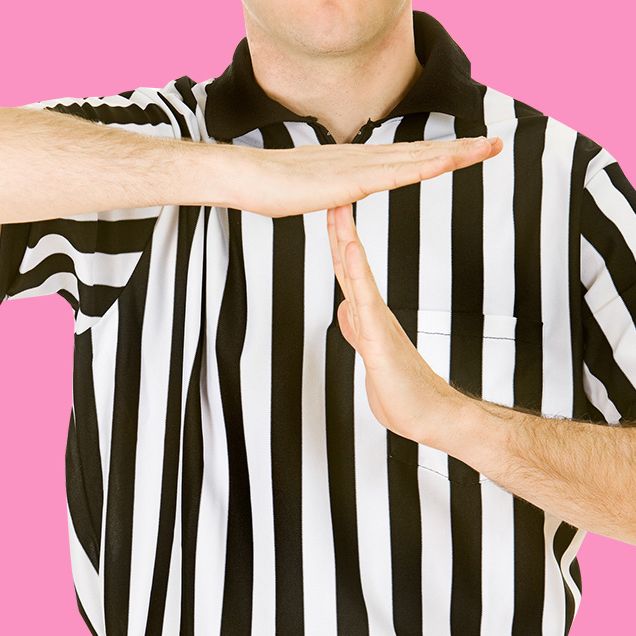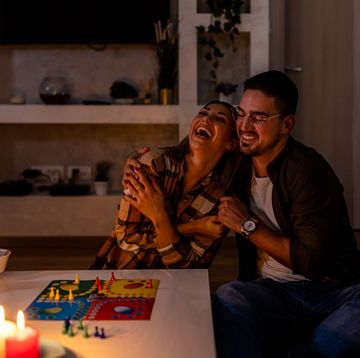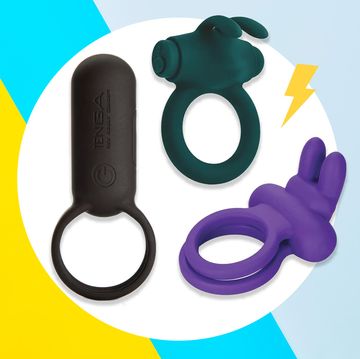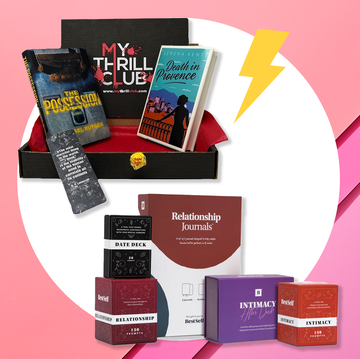Couples therapy has a way of sounding super scary. But that's totally understandable considering it’s most often associated with a relationship in serious trouble.
According to the experts, though, couples therapy can be helpful at just about any stage of a relationship—even when you think you’re pretty happy together. “I have worked with a lot of couples who come in to work on an issue before it gets out of control, which is a great approach,” says psychotherapist Ian Kerner, Ph.D., L.M.F.T., and author of She Comes First.
The major benefit of seeing a couples counselor is that the sessions teach you and your boo stellar communication skills—helpful if you’re working through something as small as where to have dinner or as big as where to spend the holidays. No matter where you are in your relationship, seeing a therapist can be a major relationship asset, not just a Hail Mary when the road gets rough.
“In many relationships, we hear what the other person has to say a thousand times and tune it out or get defensive,” says Franklin Porter, Ph.D., a psychologist and couple’s counselor in New York City. “A therapist can engage each participant in a way that helps them listen to their partner with fresh ears."
RELATED: 6 Things You and Your Partner Should Talk About Every Day
At least that’s true for almost all stages of a relationship, says Porter. “If a relationship is in a fledgling stage and you haven’t had a chance to try to work things out on your own, I think it's always preferable to seeking help immediately,” he says.
Your own how-to-lose-a-guy-in-10-days experiments aside, here are six occasions you should consider booking a couple's therapy session.
Why it’s helpful: Dealing with infidelity is often an extremely reactive situation, says Kerner. “Seeing a therapist can cut through some of the volatile feelings and bring a sense of hope and stability to an otherwise chaotic process,” he says
What you’ll learn: Affairs don’t happen in a vacuum and seeing a therapist can help both partners see the full context of the situation. A lot of times, part of that process is deciding if you want to try to repair the relationship or if you’re better off going your separate ways. A counselor can help guide you through making that decision and ultimately going through with it, no matter what that looks like.
Why it’s helpful: Even in a post-50 Shades of Grey world, a lot of couples aren’t totally comfortable talking about sex—especially when there’s an issue, says Kerner. “A good sex therapist opens up the conversation and provides a vocabulary for the couple to use to talk about these issues," he says. He or she can also help normalize the issues and provide some scientific context, so you don't feel like you're alone in your intimacy issues.
What you’ll learn: Aside from how to talk about what’s going down (or not going down) in the boudoir, a good sex therapist can assign homework to help you get back on track. That's right, sex homework.
RELATED: 4 Creative Ways to Ask for What You Want in Bed
Why it’s helpful: It's stressful enough managing your own money. Add someone else’s budget, debt, or weird financial hang-ups into the mix and you’ve got a recipe for a reoccurring fight. “Everybody deals with money very differently and often very emotionally,” says Kerner. A lot of times, people associate money with fear based on their personal history, which can be tricky to navigate without professional help.
What you’ll learn: Whether you’re always fighting over how to split the check or how much each of you should be contributing to your joint bank account, seeing a couples counselor can help demystify some of the emotionally charged currents running through your monthly bills.
Why it’s helpful: Most people would probably agree that multicultural couples are totally normal. But, unfortunately, not everyone sees it that way, says Porter. In his practice, he's met couples from different backgrounds that struggle to get support from their families or communities.
What you’ll learn: Relationships are hard enough to figure out without navigating a support system riddled with haters. Seeing a counselor can help you navigate the specific situation as a couple, whether it’s understanding each other’s backgrounds or figuring out how to handle holidays in a hostile environment.
Why it’s helpful: Couples therapy isn’t always about saving your relationship. Sometimes it’s about figuring out how to go your separate ways on good terms. And that's especially important when there are kids involved, says Porter.
What you’ll learn: A couples counselor can help you and your partner figure out if breaking up is really the best move for both of you and assist by working through the issues behind your split. That way, you can go your own way in peace. On a more practical level, a good therapist can help you figure out the details of who gets what and how you’ll share custody if there are kids or pets involved.
Why it’s helpful: Generally, couples wait until there’s a crisis to consider seeing a counselor, says Kerner. But anticipating problems that might arise from a big milestone, like moving in together or getting married, can save you a lot of heartache and hours in therapy. Going to a couples counselor early in your relationship is “helping you develop a lot of new tools to relate to each other and work through your relationship without more therapy down the road,” says Kerner.
What you’ll learn: Seeing a therapist as you head into a major milestone can ensure that you can argue effectively, communicate, and understand each other. In other words, tending to your relationship before little annoyances turn into major issues is often a smart strategy.
Macaela MacKenzie is a journalist who writes about women and power. She covers women’s equality through the lenses of sports, wellness, and the gender gap across industries and is the author of MONEY, POWER, RESPECT: How Women in Sports Are Shaping the Future of Feminism. Mac was most recently a Senior Editor at Glamour where she directed all health and wellness coverage. Her work has appeared in Elle, Glamour, SELF, Bustle, Marie Claire, Allure, Women's Health, and Forbes among other publications.













